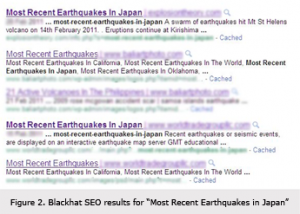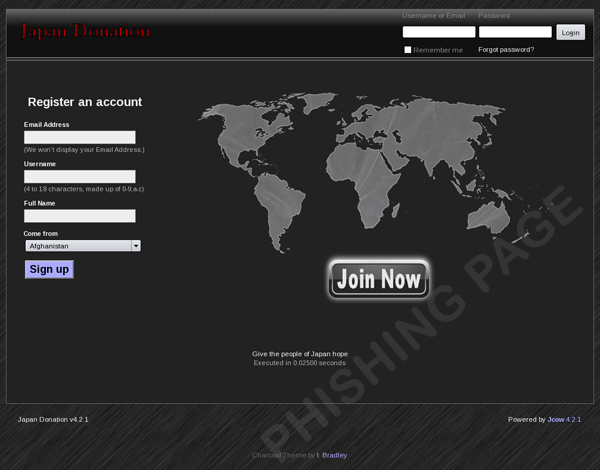By Lynette T. Owens
As we’ve all seen, read, and heard, the people of Japan are experiencing tragedy beyond what any of us could have imagined or may ever experience ourselves. Seeing the magnitude of another’s suffering stirs compassion in many of us and drives us to search for a way to help. For most of us, it will be impossible to do so in the form of direct action – being on the ground, searching for survivors, delivering food, water, and medical supplies or services simply because of the geographic distance. One of the most powerful things that the social web has allowed us to do for many global tragedies in recent history is do something – spread the word, send good thoughts, and most importantly give financial support.
Unfortunately, as we have also seen many times in recent history, human tragedy to some appears only as an opportunity to profit from another’s pain. Cybercriminals have done this in the past through several techniques such as black hat SEO attacks or poisoned searches, spam, fake websites and scam Facebook pages. We have seen this behavior whenever something happens in the world that is of high interest to masses of people – Hurricane Katrina, Michael Jackson’s death, the 2008 summer Olympics, or the earthquake in Haiti.
The most recent events in Japan show us they are at it again. And they have used all of the techniques mentioned above. This following information is useful for all of us, but if you are in a position to teach kids digital media literacy, you can use this as a teachable moment and make something good happen out of all the bad:
Black Hat SEO attack or poisoned search
A black hat SEO or search engine optimization attack occurs when cybercriminals post fake links and take actions so that their links show up near the top of the list when you search for information in a search engine like Google or Bing. Typically these links lead you to a scam site that can eventually trick you into entering personal information or downloading something that will eventually steal your personal information.
 Trend Micro researchers have found that if you search for the term “most recent earthquake in Japan”, you will see a number of deceptive links (see photo). In this case, once you click on these links, you will get pop-up messages saying something is wrong with your computer and you need to download and pay for an antivirus solution immediately to fix it.
Trend Micro researchers have found that if you search for the term “most recent earthquake in Japan”, you will see a number of deceptive links (see photo). In this case, once you click on these links, you will get pop-up messages saying something is wrong with your computer and you need to download and pay for an antivirus solution immediately to fix it.
If you see such messages, ignore them. And if you don’t already have reputable security software on your computer, you should install some immediately. It should prevent you from downloading the malicious software even if you, your students, or your kids click to download it.
Fake Facebook Page
Our researchers also found a Facebook page that is designed to appeal to people’s curiosity with a video, but instead does something your profile unbeknownst to you. Here’s what our researchers say:
“The Facebook page title is “Japanese Tsunami RAW Tidal Wave Footage!” and a script on that page leads users to a fake video page where the video is actually a clickable image. Clicking the image eventually leads users to a page asking for the user’s mobile phone number. The script also triggers an automatic “Like” and displays the link on the victim’s wall.”
This is presumably to get people in your own social network to go visit the page. DO NOT click on anything there. Better yet, don’t even go to it. For news and videos about Japan, we recommend going to reputable news organizations.
We have also found a site (still up as of this moment, but am not including a link for obvious reasons) that is designed to take your donations. It isn’t associated with any large reputable organization, so do not be tempted to give a financial donation with any organization that you’ve never heard of.
Phishing Emails and Spam
One of the oldest techniques of cybercriminals is creating unsolicited emails to fool you into giving away your personal information. Our researchers have found one that claims to be from UNICEF, but it is not:
“The scheme is quite easy to catch — the message asks the recipients to respond with personal information such as their whole name, phone number, and email address, and it is only after the recipient responds with the said information [that] they get the instructions [on] how they can make their donation.”
If you’re using a Trend product or any up-to-date reputable security software, you should be blocked from even receiving such an email. If you don’t have security software in place, you should ignore and delete messages that ask you for information before telling you how you can help. It is actually best to go directly to the website of the organization and find out how to help there, rather than clicking through from an email.
The Bottom Line
As shocking as the events of Japan have been, this criminal behavior is equally so. Unfortunately, this is a reality that we all must be prepared to handle. Education, technology, and common sense are the best ways to prevent you or anyone you know from being harmed by this.
Since you may be talking at the dinner table, in school, with friends about Japan’s crises, spread the word and let people know to be careful when they are online searching for more information about it. You can render these criminals powerless by telling your family, friends, neighbors and communities about these techniques and to stick to a few reputable sites for information about Japan.
Also, what we are seeing with cybercriminal activity reinforces the need to have reputable security software installed on your devices that is up-to-date.
Lastly, these exploitative behaviors of criminals should not dissuade or discourage anyone from giving their support to Japan. They need help more than ever. If you want to donate money to help Japan, there are many reputable organizations that you can contact, including the Red Cross.
For more information about these cybercriminal tactics, go to:
http://blog.trendmicro.com/most-recent-earthquake-in-japan-searches-lead-to-fakea/
http://blog.trendmicro.com/phishing-attack-uses-fake-donation-website/
http://blog.trendmicro.com/fakeav-101-how-to-tell-if-your-antivirus-is-fake/
For security solutions from Trend Micro, go to: www.trendmicro.com
For free tools from Trend Micro, go to: http://free.antivirus.com/
For more tips on teaching your kids and family to be safe from cybercriminals go to: www.trendmicro.com/internetsafety

Lynette Owens is Vice President of Global Consumer Education & Marketing at Trend Micro and Founder of the Internet Safety for Kids and Families program. With 25+ years in the tech industry, Lynette speaks and blogs regularly on how to help kids become great digital citizens. She works with communities and 1:1 school districts across the U.S. and around the world to support online safety, digital and media literacy and digital citizenship education. She is a board member of the National Association for Media Literacy Education, an advisory committee member of the Digital Wellness Lab, and serves on the advisory boards of INHOPE and U.S. Safer Internet Day.
Follow her on Twitter @lynettetowens.
